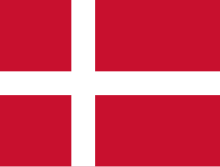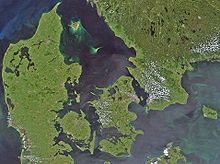Denmark
Appearance
(Redirected from Kingdom of Denmark)


Denmark, officially the Kingdom of Denmark (Danish: Kongeriget Danmark), is a country in the northern European Union. The southernmost of the Nordic countries, it is southwest of Sweden and south of Norway, and bordered to the south by Germany. Denmark is part of Scandinavia, together with Sweden and Norway. The Kingdom of Denmark is a sovereign state that comprises Denmark and two autonomous constituent countries in the North Atlantic Ocean: the Faroe Islands and Greenland. The country consists of a peninsula – Jutland – and an archipelago of 443 named islands, of which around 70 are inhabited. The islands are characterized by flat, arable land and sandy coasts, low elevation and a temperate climate.
Quotes
[edit]
C
[edit]- We are not Denmark. I love Denmark. We are the United States of America, and it is our job to rein in the excesses of capitalism.
- Hillary Clinton, quoted on Quartz (13 October 2015), "Hillary and Bernie spar: Who loves Denmark more?"
D
[edit]- Well, what if I'm wrong, I mean — anybody could be wrong. We could all be wrong about the Flying Spaghetti Monster and the pink unicorn and the flying teapot. You happen to have been brought up, I would presume, in a Christian faith. You know what it's like to not believe in a particular faith because you're not a Muslim. You're not a Hindu. Why aren't you a Hindu? Because you happen to have been brought up in America, not in India. If you had been brought up in India, you'd be a Hindu. If you had been brought up in Denmark in the time of the Vikings, you'd be believing in Wotan and Thor. If you were brought up in classical Greece, you'd be believing in Zeus. If you were brought up in central Africa, you'd be believing in the great Juju up the mountain. There's no particular reason to pick on the Judeo-Christian god, in which by the sheerest accident you happen to have been brought up and ask me the question, "What if I'm wrong?" What if you're wrong about the great Juju at the bottom of the sea?
- Richard Dawkins, Answering audience questions after a reading of The God Delusion[1], Randolph-Macon Woman's College, (23 October 2006)
- Posed question: "This is probably going to be the most simplest one for you to answer, but: What if you're wrong?"
F
[edit]- European centrists are deeply confused about immigration. Many, especially on the centre-left, want to have both open borders and welfare states. But the evidence suggests that it is hard to be Denmark with a multicultural society. The lack of social solidarity makes high levels of taxation and redistribution unsustainable.
- Niall Ferguson,"The EU melting pot is melting down", Boston Globe, June 18, 2018.
- The fact that Danish business leaders are warning of damage to the nation's brand, it is, however, strangely welcome. Seeming much more unfriendly and closed than other countries is the only path open to desperate politicians facing exploding costs and seemingly insurmountable integration issues. And darker measures may still lie ahead.
- Kasper Fogh, "Refugee crisis: Why Scandinavian countries are trying to look bad" (8 February 2016), CNN
J
[edit]- The Northmen are often said to have burst out of their coastal settlements in what is now Sweden, Norway, and Denmark at the end of the eighth century. The most famous account of their arrival into the Christian realms of the west comes from Britain. In 793 warriors appeared off the coast of Northumbria, leaped from their ships, and robbed the island of Lindisfarne, desecrating the monastery and murdering its brothers. This ferocious raid sent shock waves rippling out from Britain. When the news reached Charlemagne’s court in Aachen, Alcuin of York wrote to the king of Northumbria, deploring the fact that “the church of St Cuthbert is spattered with the blood of the priests of God, stripped of all its furnishing, exposed to the plundering of pagans.” He suggested to the king that he and his noblemen might mend their ways, starting by adopting more Christian haircuts and clothing styles. But it was too late for any of that. The Northmen had announced themselves as a major power in the western world. The next year, 794, raiders appeared on the other side of the British Isles, in the Hebrides. In 799 Vikings raided the monastery of Saint-Philibert at Noirmoutier, just to the south of the river Loire. Sixty years later Viking raids would be a painful feature of life not only in the North and Irish Seas but as far away as Lisbon, Seville, and north Africa, as Northmen tangled with Anglo-Saxons, Irish, Umayyads, and Franks. In 860 a band of Viking-descended warriors from what is now northwest Russia even sailed to Constantinople via the river Dnieper and the Black Sea, and laid the city under siege. Although exposed only to a tiny part of this, the chronicler of Noirmoutier wrote what could have been an epigram for the entire age: “The number of ships grows, the endless stream of Vikings never ceases to increase . . . the Vikings conquer everything in their path and nothing resists them.”
- Dan Jones, Powers and Thrones: A New History of the Middle Ages (2021).
K
[edit]- Americans reflexively believe that 'Had Germany occupied the United States, nearly all of us would have joined an armed resistance to the Nazis. That's what I thought, too, when I was 16. But that reflects a hopelessly naive view, both of what the world looked like to most people after the Nazis had conquered Austria, Poland, Czechoslovakia, Holland, Belgium, Luxembourg, Denmark, Norway and France, and of what it actually meant to take up arms against an occupying power'.
- Charles Kaiser, "What Americans forget about French resistance" (7 May 2015), Cable News Network, Atlanta, Georgia.
M
[edit]- The European Union and many of its countries, which used to take initiatives in the United Nations for peaceful settlements of conflict, are now one of the most important war assets of the U.S./NATO front. Many countries have also been drawn into complicity in breaking international law through U.S./U.K./NATO wars in Afghanistan, Iraq, Libya, and so on.
R
[edit]- I know that some people in the U.S. associate the Nordic model with some sort of socialism... Therefore, I would like to make one thing clear. Denmark is far from a socialist planned economy. Denmark is a market economy... The Nordic model is an expanded welfare state which provides a high level of security to its citizens, but it is also a successful market economy with much freedom to pursue your dreams and live your life as you wish.
- Lars Løkke Rasmussen, "Nordic Solutions and Challenges: A Danish Perspective" (October 2015), speech to Harvard's Kennedy School of Government
S
[edit]- When you look around the world, you see every other major country providing health care to all people as a right, except the United States. You see every other major country saying to moms that, when you have a baby, we’re not gonna separate you from your newborn baby, because we are going to have — we are gonna have medical and family paid leave, like every other country on Earth. Those are some of the principles that I believe in, and I think we should look to countries like Denmark, like Sweden and Norway, and learn from what they have accomplished for their working people.
- Bernie Sanders, quoted on Fortune (February 17, 2016), "Bernie Sanders Was Right: Denmark Is the Best Nation for Working People"
- Something is rotten in the state of Denmark.
- William Shakespeare, Hamlet, Act I, scene 4, line 90.
See also
[edit]External links
[edit]Wikibooks has a book on the topic of






